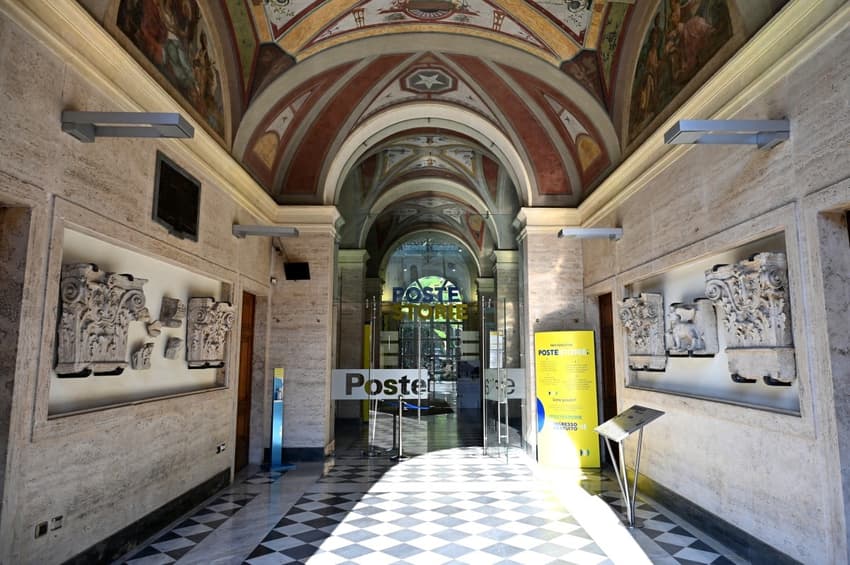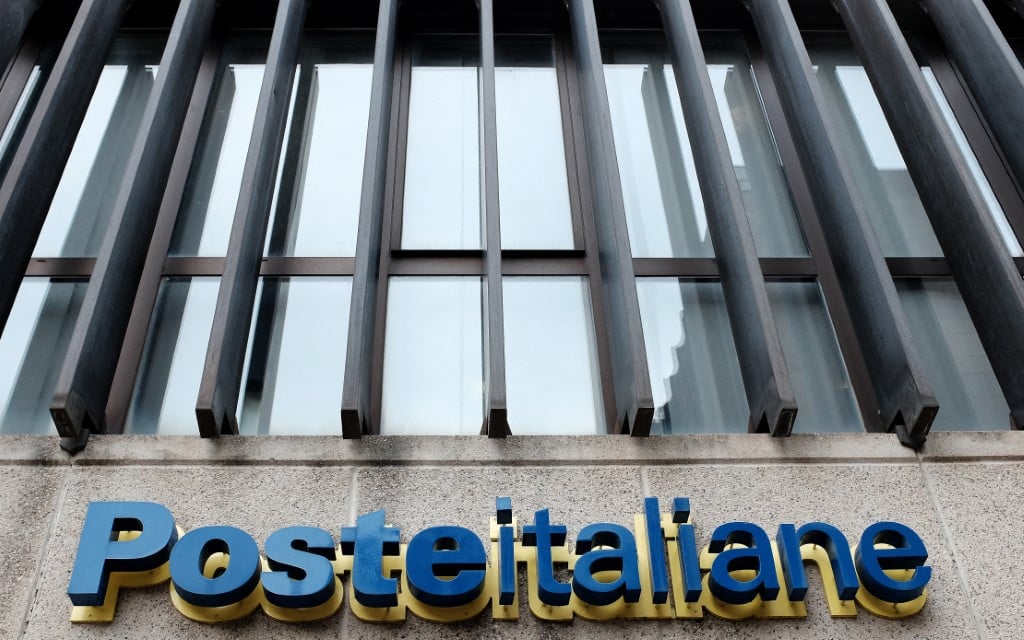Nine things you can do at an Italian post office apart from buying stamps

From submitting a residency permit application to accessing financial services and paying utility bills, sending mail isn't the only thing you'll be able to do at a post office in Italy.
While you may not have any trouble finding one (there are over 12,000 establishments across the country), Italian post offices aren’t always easy to figure out, not least because they tend to be fairly crowded and information in English can be hard to come by, especially in the smaller branches.
But whether you hate them or love them, post offices in Italy aren’t just where you’ll go to send mail to friends or relatives back home, or to pick up a care package if you weren’t home to receive it.
Italian uffici postali are a key part of life in Italy as they’re a hub for a number of citizen services, including some bureaucratic procedures. Here's a look at some of the things you can do at a post office in Italy.
Access banking services
Italy’s Poste Italiane has an entire branch – BancoPosta (literally, ‘BankPost’) – dedicated to providing customers with a wide range of financial services, including savings accounts, prepaid cards, exchange brokerage services, investments, insurance, and various online payment services.
READ ALSO: The verdict: What are the best banks for foreigners in Italy?
This means that the major post offices around the country (the smaller establishments generally don’t have the capacity to manage financial services) essentially double up as banks, allowing you to take out loans and mortgages, make investments and manage a pension plan. Further information can be found here.
Complete your permesso di soggiorno application
Italy’s residence permit is a necessary hurdle for non-EU nationals looking to stay in the country for more than three months.
For most types of permesso, the application begins with a visit to the nearest post office with a sportello amico (literally, ‘friendly desk’), where you’ll be asked to fill out the relevant form and provide the necessary documentation. Once you’ve submitted the application, the process will continue at the local police headquarters (Questura).
Request or renew a passport
As of Monday, March 11th, it’ll be possible to request a passport or renew an existing one in a number of post offices around the country as part of the government’s ‘Polis Project’ – a nationwide scheme to digitalise citizen services and streamline bureaucracy.
The new passport services will be available in some 7,000 offices (for a total of 16 million residents involved), all located in municipalities (or comuni) with up to 15,000 inhabitants. A full list of comuni involved in the initiative should be released by Poste Italiane in the coming days.
READ ALSO: How soon can I get an Italian passport after gaining citizenship?
Applicants will be asked to submit the necessary documentation directly with the post office staff, who will then process it and send it to the relevant Questura. Once completed, the passport will be delivered straight to your home address.

The Poste Italiane logo at the entrance of a post office in Rome. Photo by Alberto PIZZOLI / AFP
Ask for registry records and residency certificates
As of January 19th, under the same scheme mentioned above, some selected post offices around the country are allowed to release records and certificates held by Italy’s population registry (or Anagrafe).
Services include the issuance of residency and family status certificates. A full list of available certificati anagrafici can be found here.
Buy a phone or home internet plan
Next to a financial branch, Poste Italiane also has a telecommunications unit, which means that you can purchase a mobile or landline phone plan as well as broadband services in some selected post offices or via Poste Italiane’s online services.
Pay your utility bills
Nowadays, most people in Italy prefer to pay their utility bills online, but it’s still possible to go and pay them at the post office through a bollettino postale (postal money order).
This remains a convenient option for those who want to pay in cash or don’t feel confident making payments with credit or debit cards online.
Set up your digital ID account
Having a SPID account is a pretty convenient way to save yourself a trip to the nearest government office to file some basic paperwork as it gives residents access to a range of key online public services (including some of Italy's home bonuses).
READ ALSO: What is a SPID and how do you get one?
You can set up the digital ID system at your local post office or via the Poste Italian app or website.
Purchase collectors’ stamps
Stamp enthusiasts can purchase a range of collectors’ items at major post offices around the country. You can also order the stamps you have your eye on online and have them delivered straight to your address.
Send mail (even from home)
Alongside all of the above services, the post office is, of course, still the place to go to if you’re looking to send a letter or a package, or to pick one up if you weren’t home to receive it.
The wait times can be pretty long, especially in smaller branches, which is why it’s generally advisable to book your visit through the Poste Italiane app. Alternatively, it’s possible to send some types of documents to the post office electronically and have them print them out, put them in an envelope, and mail them for you without you ever leaving the house.
This is a non-exclusive list. Have we missed anything? Let us know in the comments below.
Comments
See Also
While you may not have any trouble finding one (there are over 12,000 establishments across the country), Italian post offices aren’t always easy to figure out, not least because they tend to be fairly crowded and information in English can be hard to come by, especially in the smaller branches.
But whether you hate them or love them, post offices in Italy aren’t just where you’ll go to send mail to friends or relatives back home, or to pick up a care package if you weren’t home to receive it.
Italian uffici postali are a key part of life in Italy as they’re a hub for a number of citizen services, including some bureaucratic procedures. Here's a look at some of the things you can do at a post office in Italy.
Access banking services
Italy’s Poste Italiane has an entire branch – BancoPosta (literally, ‘BankPost’) – dedicated to providing customers with a wide range of financial services, including savings accounts, prepaid cards, exchange brokerage services, investments, insurance, and various online payment services.
READ ALSO: The verdict: What are the best banks for foreigners in Italy?
This means that the major post offices around the country (the smaller establishments generally don’t have the capacity to manage financial services) essentially double up as banks, allowing you to take out loans and mortgages, make investments and manage a pension plan. Further information can be found here.
Complete your permesso di soggiorno application
Italy’s residence permit is a necessary hurdle for non-EU nationals looking to stay in the country for more than three months.
For most types of permesso, the application begins with a visit to the nearest post office with a sportello amico (literally, ‘friendly desk’), where you’ll be asked to fill out the relevant form and provide the necessary documentation. Once you’ve submitted the application, the process will continue at the local police headquarters (Questura).
Request or renew a passport
As of Monday, March 11th, it’ll be possible to request a passport or renew an existing one in a number of post offices around the country as part of the government’s ‘Polis Project’ – a nationwide scheme to digitalise citizen services and streamline bureaucracy.
The new passport services will be available in some 7,000 offices (for a total of 16 million residents involved), all located in municipalities (or comuni) with up to 15,000 inhabitants. A full list of comuni involved in the initiative should be released by Poste Italiane in the coming days.
READ ALSO: How soon can I get an Italian passport after gaining citizenship?
Applicants will be asked to submit the necessary documentation directly with the post office staff, who will then process it and send it to the relevant Questura. Once completed, the passport will be delivered straight to your home address.

Ask for registry records and residency certificates
As of January 19th, under the same scheme mentioned above, some selected post offices around the country are allowed to release records and certificates held by Italy’s population registry (or Anagrafe).
Services include the issuance of residency and family status certificates. A full list of available certificati anagrafici can be found here.
Buy a phone or home internet plan
Next to a financial branch, Poste Italiane also has a telecommunications unit, which means that you can purchase a mobile or landline phone plan as well as broadband services in some selected post offices or via Poste Italiane’s online services.
Pay your utility bills
Nowadays, most people in Italy prefer to pay their utility bills online, but it’s still possible to go and pay them at the post office through a bollettino postale (postal money order).
This remains a convenient option for those who want to pay in cash or don’t feel confident making payments with credit or debit cards online.
Set up your digital ID account
Having a SPID account is a pretty convenient way to save yourself a trip to the nearest government office to file some basic paperwork as it gives residents access to a range of key online public services (including some of Italy's home bonuses).
READ ALSO: What is a SPID and how do you get one?
You can set up the digital ID system at your local post office or via the Poste Italian app or website.
Purchase collectors’ stamps
Stamp enthusiasts can purchase a range of collectors’ items at major post offices around the country. You can also order the stamps you have your eye on online and have them delivered straight to your address.
Send mail (even from home)
Alongside all of the above services, the post office is, of course, still the place to go to if you’re looking to send a letter or a package, or to pick one up if you weren’t home to receive it.
The wait times can be pretty long, especially in smaller branches, which is why it’s generally advisable to book your visit through the Poste Italiane app. Alternatively, it’s possible to send some types of documents to the post office electronically and have them print them out, put them in an envelope, and mail them for you without you ever leaving the house.
This is a non-exclusive list. Have we missed anything? Let us know in the comments below.
Join the conversation in our comments section below. Share your own views and experience and if you have a question or suggestion for our journalists then email us at [email protected].
Please keep comments civil, constructive and on topic – and make sure to read our terms of use before getting involved.
Please log in here to leave a comment.